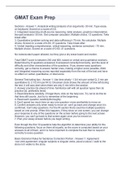Exam (elaborations)
GMAT Exam Prep with complete solutions.
Sections
1. Analytical writing (analysis of an argument)- 30 min. Type essay on keyboard. Scored on a scare of 0-6.
2. Integrated reasoning (multi-source reasoning, table analysis, graphics interpretation, two-part analysis)- 30 min. Get computer calculator. Multiple choice. 12 questions. Take br...
[Show more]
Preview 2 out of 11 pages
-
July 21, 2022
-
11
-
2021/2022
-
Exam (elaborations)
-
Questions & answers
All documents for this subject (428)
GMAT Exam Prep
Sections - Answer 1. Analytical writing (analysis of an argument)- 30 min. Type essay
on keyboard. Scored on a scare of 0-6.
2. Integrated reasoning (multi-source reasoning, table analysis, graphics interpretation,
two-part analysis)- 30 min. Get computer calculator. Multiple choice. 12 questions. Take
break after.
3. Quantitative (problem solving and data sufficiency)- 75 min. No calculator. Multiple
choice. Scored on a scale of 0-60. 37 questions. Take break after.
4. Verbal (reading comprehension, critical reasoning, sentence correction) - 75 min.
Multiple choice. Scored on a scale of 0-60. 41 questions.
No notes/scratch paper allowed, but they give a dry erase board and marker.
Total GMAT score is between 200 and 800, based on verbal and quantitative sections.
Determined by # questions answered, # answered correctly/incorrectly, and the level of
difficulty and other characteristics of the questions. If you answer easy questions
correctly, get a chance to answer harder ones, making a higher score possible. AWA
and Integrated reasoning scores reported separately from the rest of the test and have
no effect on verbal, quantitative, or total score.
General Test-taking tips - Answer 1. Use time wisely- 1 3/4 min per verbal Q, 2 min per
quantitative Q. 2 1/2 min per IR Q. Onscreen clock shows the amount of time left during
the test. It will auto alert when there are only 5 min left in the section.
2. Answer practice Qs ahead of time- familiarize self with all question types then do
practice Qs, preferably timed.
3. Read directions carefully- if forget them, click on the help icon. Try not to do this bc
that time still counts. Just try to remember at the beginning.
4. Read each question carefully/thoroughly.
5. Don't spend too much time on any one question- more worthwhile to move on.
6. Confirm answers only when ready to move on- can't go back and change once it is
confirmed. Can't skip questions. For the IR section there could be multiple questions
based on one prompt. When this happens, if they show on one screen, you can change
your response to any of the questions on the screen before going to the next screen.
However, you can't go back to that screen again once you've moved on.
7. Plan your essay answer before you begin writing.
Even though the first 10 questions help the algorithm to determine your ability for the
following questions, focus on them all equally, as the score is computed based on your
answers to all of them, and it is more important to complete the test than to respond
correctly to every question.
Basic Grammar Rules for Sentence Correction Portion - Answer 1. Agreement:
-non-verb agreement: singular subjects w singular verbs, plural w plural. I walk to the
store not I walks to the store.
, -pronoun agreement: pronoun must agree w/ noun/pronoun it refers to in person,
number, and gender. When you dream, you are usually asleep, not when one dreams,
you are usually asleep.
2. Diction:
-among vs between: among refers to relationships involving >2 objects. Between is for
relationships with only 2 objects.
-as vs like: As can be a preposition meaning "in capacity of" or can be a conjunction of
manner followed by a verb. Like is used as a preposition, and should be followed by a
noun, object pronoun, or verb ending in -ing.
-mass and count words: mass words are nouns quantified by an amount rather than a
number. Count words are nouns quantified by a number.
-pronouns: myself shouldn't substitute I or me.
3. Grammatical Construction:
-fragments: parts of a sentence disconnected from the main clause.
-run-on sentences: two independent clauses that run together without proper
punctuation.
-constructions: wordy and redundant.
4. Idiom: Nonstandard expressions should be avoided, although English idioms don't
always follow conventional grammatical rules. Be sure to use the correct idiom when
using the constructions and parts of speech.
-Prepositions: specific prepositions have specific purposes jog in the morning vs jog on
the morning.
-Correlatives: word combos such as "not only... but also" should be followed by an
element of the same grammatical type.
-Forms of comparison: fewer refers to a specific number, whereas less than refers to a
continuous quantity. Between... and is the correct for to designate a choice. Farther is
for distance, further refers to degree.
5. Logical Predication: phrases detracting from the logical argument.
-modification problems: modifiers should be positioned so it is clear what word(s) they
are modifying. I put the cake that I baked by the door not I put the ake by the door that I
baked.
6. Parallelism: making sure different elements in a sentence balance one another. The
only way to know is to take the plunge, not the only way to know is taking the plunge.
7. Rhetorical construction: Awkward, wordy, redundant, imprecise, or unclear
constructions should be avoided even when they are free of grammatical errors.
8. Verb Form: correct tenses.
-present perfect: has/have + verb.
-past perfect: had + verb.
-future perfect: will have.




